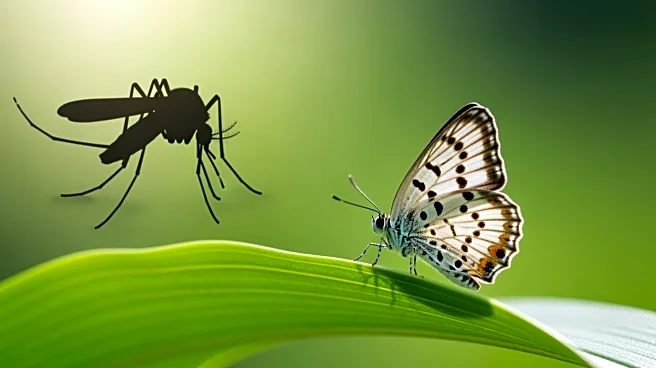What's Happening?
A recent study has developed a male-drive female-sterile (MDFS) genetic system aimed at controlling the population of the malaria mosquito, Anopheles gambiae. The system involves a genetic construct that
disrupts the female-specific exon of the doublesex gene, leading to female sterility. The construct is inserted into the mosquito genome using recombinase-mediated cassette exchange, resulting in males that can transmit the allele at super-Mendelian rates. The study found that MDFS females exhibit both external and internal abnormalities, rendering them sterile. The system is designed to suppress mosquito populations by preventing females from reproducing, while males remain fertile and continue to spread the genetic modification.
Why It's Important?
The development of the MDFS system represents a significant advancement in vector control strategies, particularly for malaria, which remains a major public health challenge. By targeting the reproductive capabilities of female mosquitoes, this approach could lead to a reduction in mosquito populations and, consequently, a decrease in malaria transmission. The ability to control mosquito populations without relying on chemical insecticides offers a sustainable and environmentally friendly solution. This genetic approach could potentially transform public health strategies in regions heavily affected by malaria, providing a new tool in the fight against this disease.
What's Next?
Further research and trials are necessary to evaluate the effectiveness and safety of the MDFS system in real-world settings. The study suggests that repeated releases of MDFS males could lead to the collapse of mosquito populations in controlled environments. However, the application in natural settings will require careful consideration of ecological impacts and potential resistance development. Regulatory approval and public acceptance will also play crucial roles in the deployment of this technology. Continued monitoring and adaptation of the strategy will be essential to ensure its long-term success and sustainability.
Beyond the Headlines
The ethical implications of genetically modifying organisms for population control are significant. While the potential benefits in terms of disease reduction are clear, concerns about ecological balance and unintended consequences must be addressed. The introduction of genetically modified mosquitoes into the environment raises questions about biodiversity and the potential impact on ecosystems. Public engagement and transparent communication will be key to addressing these concerns and gaining support for the technology.










